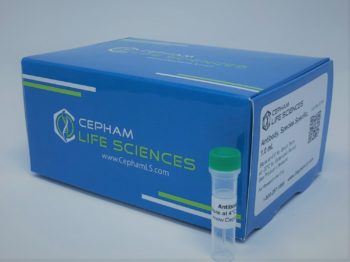Description
Aliases
MEF2, ADCAD1, RSRFC4, RSRFC9
Antibody Type
Polyclonal Antibody
Uniprot ID
Swiss-Prot: Q02078
NCBI Protein: NP_001124398.
Immunogen
Peptide sequence around phosphorylation site of threonine 312 (L-A-T(p)-P-V) derived from Human MEF2A.
Raised In
Rabbit
Species Reactivity
Human Mouse Rat
Tested Applications
WB IHC IF Recommended dilution: Predicted MW: 54kd, Immunohistochemistry: 1:50~1:100, Immunofluorescence: 1:100~1:200
Background / Function
The process of differentiation from mesodermal precursor cells to myoblasts has led to the discovery of a variety of tissue-specific factors that regulate muscle gene expression. The myogenic basic helix-loop-helix proteins, including myoD (MIM 159970), myogenin (MIM 159980), MYF5 (MIM 159990), and MRF4 (MIM 159991) are one class of identified factors. A second family of DNA binding regulatory proteins is the myocyte-specific enhancer factor-2 (MEF2) family. Each of these proteins binds to the MEF2 target DNA sequence present in the regulatory regions of many, if not all, muscle-specific genes. The MEF2 genes are members of the MADS gene family (named for the yeast mating type-specific transcription factor MCM1, the plant homeotic genes ‘agamous’ and ‘deficiens’ and the human serum response factor SRF (MIM 600589)), a family that also includes several homeotic genes and other transcription factors, all of which share a conserved DNA-binding domain K Satoh, J Ohnishi, A Sato, et al. (2007) Nemo-Like Kinase-Myocyte Enhancer Factor 2A Signaling Regulates Anterior Formation in Xenopus Development. Molecular and Cellular Biology, 27(21):7623-30. This article references the use of the #11039 in the following applications :Western blotting
Conjugate
Unconjugated
Storage Buffer
Supplied at 1.0mg/mL in phosphate buffered saline (without Mg2+ and Ca2+), pH 7.4, 150mM NaCl, 0.02% sodium azide and 50% glycerol.
Form
liquid
Storage
Shipped at 4°C. Upon delivery aliquot and store at -20°C or -80°C. Avoid repeated freeze.
Purity
Antibodies were produced by immunizing rabbits with synthetic phosphopeptide and KLH conjugates. Antibodies were purified by affinity-chromatography using epitope-specific phosphopeptide. Non-phospho specific antibodies were removed by chromatogramphy using non-phosphopeptide.
Modification
Phospho-Thr312
Additional information
| Size | 100?l |
|---|


